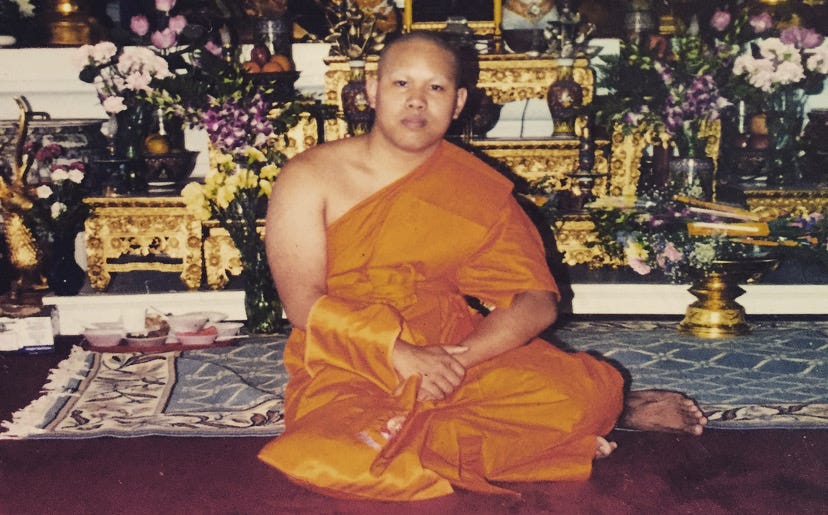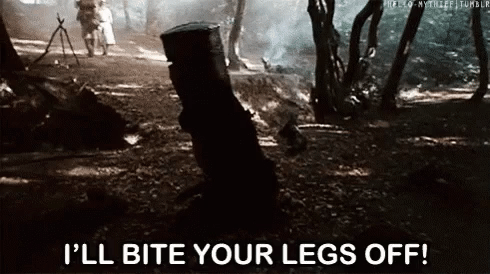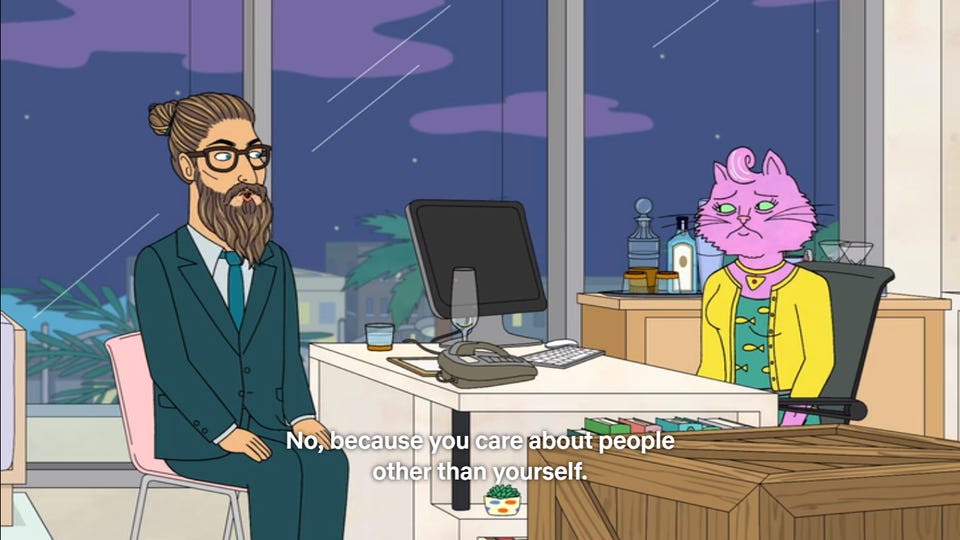Greed, Fear, and Investing with Mindfulness
On Investing, Problem-Solving, and the Search for Mindfulness
Welcome to the Nongaap Newsletter! I’m Mike, an ex-activist investor, who writes about tech, corporate governance, the power & friction of incentives, strategy, board dynamics, and the occasional activist fight.
If you’re reading this but haven’t subscribed, I hope you consider joining me on this journey.
I promise this isn’t a meditation post, but I do discuss it briefly.
If you’re interested in learning more about mindfulness and its application to investing and problem-solving keep reading.
If not, there’s a very entertaining (imo) section on “managing up” (with a Bojack Horseman reference to boot) you can scroll down to.
Mindfulness is a tricky topic. It’s very personal and everyone has their own definition of what mindfulness means and what works for them. Whether it’s meditation or journaling or something else, the path to achieving mindfulness is very hard to nail down.
As the New Year begins, it’s only natural to take inventory of where you’ve been and where you want to go.
I wanted to share some thoughts and (free) resources that I found helpful both personally and professionally in my “mindfulness” journey.
TLDR Summary
First, a quick shoutout to my friend Scott Rocher for releasing mindfulness app Cactus. Meditation isn’t for everyone and I love seeing apps like Cactus approach mindfulness “differently”. Overall, I’ve enjoyed the journaling and thoughtful Q&A approach Cactus has taken to mindfulness.
Sometimes the key to being a good investor comes down to “relative mindfulness”. It’s less about being “greedy” when others are “fearful” and more about being less fearful.
Price volatility can push management teams toward strategic alternatives due to the stressful environment it creates and the negative impact it has on management’s psyche. It’s easier to get rid of stress and anxiety by selling than to be mindful and stay focused on execution.
When you really think about it, you’re in the “peace of mind” business with your bosses, customers, investors, etc. Yes, you’re “hired” to do a certain job, but being indispensable is as much about how you make people feel as it is about the work you produce.
Mindfulness is as much about unlocking problem-solving abilities as it is about managing stress, being present, and not being overly reactive or overwhelmed by what’s going on around us. Mindfulness can drive “divergent thinking” which allows us to solve complex, interdisciplinary problems.
Reading, writing, walks, shower thoughts, journaling, a good night’s sleep, physical activity, and even Twitter (seriously) can be good alternatives to meditation and boost mindfulness.
Remember, just like investing, mindfulness is a process not an answer.
Mindfulness Journey
I’ve gone on plenty of Quixotic journeys, especially in search of mindfulness and meaning.
Case in point:
Weird flex, but ok. This isn’t meant to give me credibility. It’s meant to show I’ve really, really tried to explore my place in this world and I’m still sorting things out. I’ll be the first to tell you I don’t have the answers to mindfulness. And frankly, there’s no right way to improve or achieve mindfulness.
Everyone is on a unique journey and what works for me might not work for you (and vice versa). It’s a personal process.
That said, it’s easy to get cynical about “McMindfulness” and the profit motives of the mindfulness “industry”:
Rather than applying mindfulness as a means to awaken individuals and organizations from the unwholesome roots of greed, ill will and delusion, it is usually being refashioned into a banal, therapeutic, self-help technique that can actually reinforce those roots.
I try to be open minded about these mindfulness-as-a-service offerings, but I understand why people would be turned off. My general stance on meditation is this:
If meditation works for you, great! If not, no worries. You don’t have to force yourself to do something that doesn’t work, and you certainly don’t have to pay money. You can try other methods to find your flow. What’s important is your mindfulness is a process, not an answer.
Speaking of answers, I do believe 42 is the answer to the Ultimate Question of Life, The Universe, and Everything (Bad joke. Sorry.)
The 42 reference is a random excuse to mention Calm’s (meditation app) $69.99 annual pricing structure reminds me of Hitchhiker’s Guide: “What do you get if you multiply six by nine? Six by nine. Forty two.” Nice. (This is a mindful post, not a mature one.)
By the way, no judgment from me if you pay for meditation apps. Do what works for you. Like I said, the road to mindfulness is different for everyone. For me, it required making trade-offs in my 20s but that was a personal decision (you don’t need to make “trade-offs” to pursue mindfulness) and in the end I’m a better person and investor for it.
Mindfulness and Investing
We all would love to embrace Warren Buffett’s advice on investing, fear, and greed, but as the saying goes easier said than done. The investment profession can be a very tough business, and you’re already dealing with a lot of stress in good times let alone bad times.
While individual investors can be nimble and “greedy”, the dynamics are a bit different within a fund complex where you must account for your colleagues, bosses, investment mandate, and ultimately LPs.
You might be incredibly “greedy”, but the fund could be in full blown “fear” mode. It’s frustrating, but it can also be a completely rational decision for the fund (as counter-intuitive as it sounds).
I think this emotional swirl is pretty well understood among professionals, and I think most folks understand how loss aversion, behavioral biases, and spikes in stress (cortisol) can influence investing decisions and make people more risk-averse.
I’d love to give you a bullet-proof recommendations to improve your mindfulness to reduce stress and turn into a better investor, but it’s tough.
Just like investing, mindfulness is a process.
I with I could tell you I was “greedy” in December 2018, but I was buying with some genuine apprehension.
I have the luxury of hindsight today, but my mindfulness was definitely tested and I still felt apprehensive despite objectively believing December 2018 was a great buying window.
So why was I buying if I was “fearful”?
Sometimes the key to being a good investor comes down to “relative mindfulness”.
I felt apprehensive, but most investors probably felt worse on a relative basis. Consequently, there was a window of opportunity where I was not as “fearful” looking at potential opportunities relative to other shareholders at the time.
That slight advantage in objectivity is sometimes all you need to make a profitable decision. In this particular case, just acknowledging I was feeling apprehensive helped with my mindfulness process and re-centered me to make more objective decisions.
Of course, being mindful doesn’t mean don’t do your homework or you’ll end up catching a falling knife.
Overall, the main “mindfulness” lesson here is:
Relative mindfulness is an advantage. Others have just as hard of a time staying objective which creates opportunities for those who are just a little more mindful of the situation. You don’t have to be “greedy” when others are “fearful”. Just feeling a little less fearful is already a huge advantage.
Mindfulness and Strategic Alternatives
Personal observation but market volatility has a tendency of nudging CEOs who are already sitting on the strategic alternatives fence towards selling. Might not happen right away, but volatility tends to be the catalyst to begin the selling process. It happened in tech after the February 2016 sell-off and a similar dynamic occurred during the Q4 2018 market sell-off.
Optically, one reason sell-offs nudge CEOs and Boards toward selling is the acquisition premium is now alluring. Never mind the takeout price is equivalent to what the stock was trading at a few months prior. The 40% to 50% premium now looks attractive to battered shareholders who are dealing with their own stresses.
Another reason why sell-offs drive strategic alternatives is management’s psyche. It’s easier to sell the Company than re-focus (both strategically and mentally) and navigate through a stressful period in the Company’s public life. Operating a public Company can be very tiring on management teams, and it’s much easier to cash-out and move-on versus staying the course (even if it’s financially more lucrative to stay the course).
Further, management teams are dealing with public shareholders that are usually very unhappy and vocal in these situations which creates even more stress in an already stressful situation. Call it a “stress flywheel”.
Given this ramp in stress, it’s understandable why management teams would be receptive to overtures by strategic and financial buyers (many of whom have been working on these teams to sell for years). The opportunity to “remove stress” with a deal is a powerful lure.
This is why it is essential for management to have supportive shareholders, Directors, and coaches to help them with their focus and mindfulness during times of high stress. And unsurprisingly, those who decide to stick it out as a public company tend to be much more focused (mentally and strategically) on execution which ultimately drives superior returns.
Mindfulness and “Managing Up”
When you really think about it, you’re in the “peace of mind” business with your bosses, customers, and investors. Yes, you’re “hired” to do a certain job, but being indispensable is as much about how you make people feel as it is about the work you produce.
And the further up you move in an organization, the more important your ability to give “peace of mind” becomes. I only bring this up because there’s always a subset of leadership that thinks mindfulness is mumbo jumbo (and maybe the versions they’re exposed to is indeed mumbo jumbo), but many of these folks would raise a massive fuss if they lost their long-time and reliable executive assistant.
Why? Because mindfulness comes in many forms. A great executive assistant is capable of giving peace-of-mind, anticipating needs, and allowing an executive to focus on their job. They are arguably an off-label therapist/guru whether folks want to acknowledge it or not.
Part Assistant, Part Guru: Everyone probably knows a real-life version of Judah Mannowdog from Bojack Horseman.
Just because you’re not explicitly addressing mindfulness doesn’t mean your desire for mindfulness and removing stress goes away. More often than not, people will implicitly start addressing mental health and mindfulness needs in other ways (i.e. behaviors, life changes, etc.). And often times those implicit decisions can be very self-destructive or detrimental to the person (and the organization if they’re a key decision-maker).
So while “managing up” and giving your boss “peace of mind” is important, spending too much time and energy tending to the boss’ emotional well-being is usually a sign of a bigger unaddressed issue that needs to be explicitly addressed.
Mindfulness and Problem-Solving
Whether it’s investing or engineering, the work you do likely demands creativity and innovation in order to solve complex, interdisciplinary problems.
Researchers have found that mindfulness can help strengthen the ability to generate new ideas, leading to new ways of thinking and better solutions through “divergent thinking”:
Although psychologists continue to explore the exact mechanisms by which mindfulness facilitates divergent thinking, there is convincing evidence demonstrating a causal link between being mindful and being able to engage in divergent thinking.
Whereas “convergent thinking” is linear, involving going through a list of steps to get to a single correct answer, “divergent thinking” is exploring different directions from an initial problem statement to generate many possible ideas.
This particular study focused on meditation, but there are alternative approaches to facilitate mindfulness and drive “divergent thinking”. There’s a reason so many people have breakthroughs when taking a shower.
Meditation Alternatives
Kurt Vonnegut once said:
“I believe that reading and writing are the most nourishing forms of meditation anyone has so far found. By reading the writings of the most interesting minds in history, we meditate with our own minds and theirs as well. This to me is a miracle.”
Vonnegut believed short stories were “Buddhist catnaps". He believed reading and writing could lower your heart rate and free the mind from concerns in similar ways to meditation.
Whether it’s reading or something else, I think there’s something to be said about “getting lost” in what you do and creating a free flowing mental environment that unlocks creative ideation and problem solving.
Scientific America has a pretty interesting article on the various functions of brainwaves which explains why this is the case (in particular theta brainwaves):
A person who has taken time off from a task and begins to daydream is often in a theta brainwave state. A person who is driving on a freeway, and discovers that they can't recall the last five miles, is often in a theta state--induced by the process of freeway driving. The repetitious nature of that form of driving compared to a country road would differentiate a theta state and a beta state in order to perform the driving task safely.
Individuals who do a lot of freeway driving often get good ideas during those periods when they are in theta. Individuals who run outdoors often are in the state of mental relaxation that is slower than alpha and when in theta, they are prone to a flow of ideas. This can also occur in the shower or tub or even while shaving or brushing your hair. It is a state where tasks become so automatic that you can mentally disengage from them. The ideation that can take place during the theta state is often free flow and occurs without censorship or guilt. It is typically a very positive mental state.
Reading, going-on-walks, showering, physical activities, or any other activity that’s “automatic” and can mentally disengage leads to a free flow “theta” mental state that’s akin to deep meditation.
So if meditation isn’t for you, there’s are definitely alternative way to get into the zone.
For those interested in just feeling more “present” in your day-to-day, you can also try journaling as a meditation alternative.
I’ve been enjoying the Q&A mindfulness app Cactus which is a daily journal that encourages you to take a couple minutes out of your day to reflect and answer thoughtful questions. The app is new, but I’ve been enjoying my time using Cactus and look forward to seeing what my friend Scott does next. (I have no financial interest in Cactus and wasn’t paid nor encouraged to mention Cactus. I just love exploring mindfulness, especially if it’s a non-meditation approach.)
Finally, Twitter is surprisingly another good way to work on mindfulness and feeling present.
How? Twitter is very good at angering people. LOL
If you can pause and acknowledge a tweet makes you angry, that actually goes a long way in developing your mindfulness. A similar process can be done on Instagram or any other social apps that elicits a sharp emotional response.
For many, the first step in developing better mindfulness is simply pausing and acknowledging the emotions they’re feeling. Remember, mindfulness is a process, not an answer.
I’m half convinced Jack Dorsey has turned Twitter into one massive Vipassana meditation experiment. From Jack’s tweet-storm about his 10-day silent Vipassana meditation retreat:
Consciously acknowledging and observing the anguish Twitter gives you will ultimately help you pass and dissolve away those feelings. At least that’s how Vipassana is supposed to work.
Goal Setting
Setting goals isn’t exactly about mindfulness, but it is about mindset and process. I figure it’s the New Year and most of us have resolutions and goals we’d like to accomplish.
I’m personally in the camp of you shouldn’t share your goals, but Trello has some pretty interesting points and insights about goal setting:
Receiving premature praise for a goal makes follow through less likely (especially if the goal is social status related). Receiving social recognition of your goal before you’ve even achieved it may make you less likely to do the work.
Receiving “person praise” (praise related to the individual) versus “process praise” (praise related to the method taken) could decrease your motivation. People are more positively affected by “process praise” than “person praise” after encountering failure. Focus on process.
If you’re a beginner, getting negative feedback could stop you. If you’re a beginner, you’ll need positive feedback, but if you’re an expert, the opposite is true.
Accountability doesn’t always work. That said, friends might be a better accountability partner than an acquaintance or stranger you don’t trust.
Hearing about competition might make you back off. Is this goal exercise-related? If it is, it might actually help for you to have some competition to motivate you.
A recurring theme I see is it’s much more important to focus on the process of achieving the goal and not achieving the goal itself.
We may not be perfectly rational investors, but integrating mindfulness can help us improve our our investment process and move a little bit closer to achieving our goals.
Happy New Year
I’m really excited to see what everyone accomplishes this year and the new processes they put in place. Here’s to a mindful and optimistic 2020.







